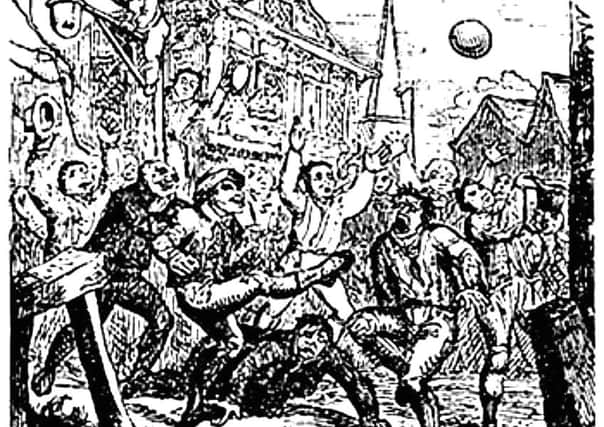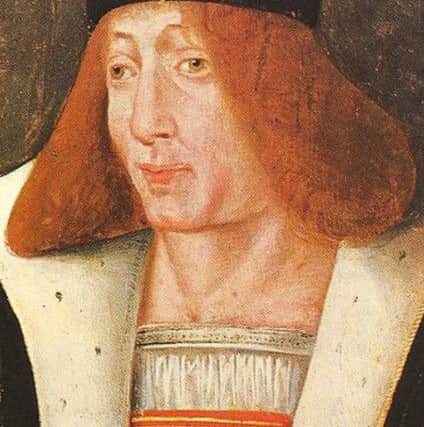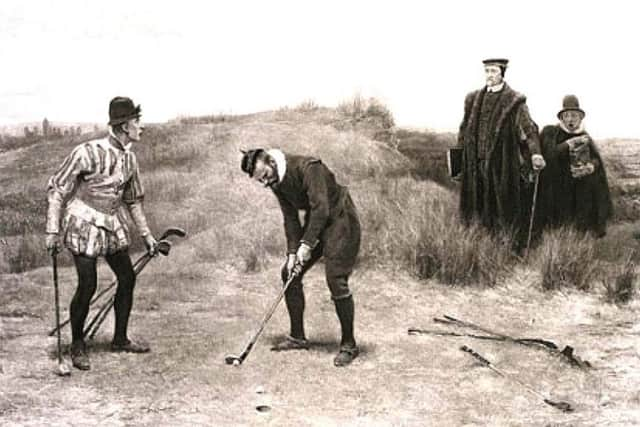When Scotland banned 'pointless' football and golf


In 1424, James I was the first King in Scotland to approve the ban with those caught “playing the futball” punished by a fine of four pence.
Football was then considered to be any ball game not played on horseback with the games unruly and sometimes violent.
Advertisement
Hide AdAdvertisement
Hide AdThe growth of the game’s popularity had become so problematic for the authorities that further legislation was required.


At this time, military training was compulsory for all males aged over 12 but the sports were proving too much of a welcome distraction.
“Instead of practising archery, ordinary people preferred to spend their leisure time playing golf and football,” a spokesman for National Library of Scotland, which holds the original 1424 statute, said.


Football was outlawed once again by James II’s Act of Parliament, passed on March 6 1457, which also introduced prohibition of golf for the first time.
The games should be “utterly condemned and stopped” with archery fully promoted.
An extract of the Act said: “It is ordained and the decreed that the lords and barons both spiritual and temporal should organise archery displays four times in the year.
“And that football and golf should be utterly condemned and stopped. And that a pair of targets should be made up at all parish churches and shooting should be practised each Sunday ... And concerning football and golf, we ordain that [those found playing these games] be punished by the local barons and, failing them, by the King’s officers.”


Advertisement
Hide AdAdvertisement
Hide AdA more punitive law was passed against “pointless sports” with a 40 shillings fine was at stake.
The statute said: “That (in) no part of the country should football, golf, or other such pointless sports be practised but, for the common good and for the defence of the country, archery should be practised and targets made up in each parish under penalty of 40 shillings to be collected by the Sheriffs and Bailiffs as previously ordained.”
James IV was to continue with the ban in 1491 although it is known that the monarch himself enjoyed both sports.
Treasury accounts show several footballs were bought for the King with handcrafted clubs made for him in Perth in 1502.


Despite the King’s interest in the sports, the ban was enforced across the country.
Francis Peabody Magoun, Jr, an American scholar with an interest in football, detailed several occasions when the ban was enforced across Scotland in his 1930s text on this history of the game in Scotland.
In 1546, the hammermen - or metalworkers - of Perth stopped their servants and apprentices from going to the South Inch to play football.
Advertisement
Hide AdAdvertisement
Hide AdIf caught, they were to leave “a pound of wax” at the altar of their patron, Saint Eloy.
Football was thriving to such an extent around Peebles that action was taken in December 1570, Magoun wrote, with any player punished with an 8 shilling fine.
In additions, their footballs would also be cut.
Archibald James Law, a minister at Kirkliston, was censured in 1585 by the synod of Lothian for playing football on a Sunday.
In June 1601, the Privy Council of Scotland heard of a fight which erupted on the pitch at a football game at Lochton in The Merse, Berwickshire - and ended in gunfire.
Several men, while playing football “fell into contention and controversy with one another, and shot and fired off pistols and hackbuts.’
James VI was to later decry football as a “rough and violent exercise” with running, jumping, wrestling, fencing, dancing, playing catch or tennis, archery and pall-mall recommended instead.
Burgh, trades and church authorities throughout Scotland, as well as Parliament, disapproved of ordinary people playing golf when they should have been at work or church.
Advertisement
Hide AdAdvertisement
Hide AdThose punished included six boys caught playing on the Sabbath at North Inch, Perth, in 1604, with their clubs.
The ringleader fined was all were ordered to make public repentance before the congregation.
J C Dollman’s painting ‘The Sabbath Breakers’ details two golfers being caught golfing on the links by a pair of stern-looking clerics.
A new act was later passed for better observation of the Lord’s Day with “boisterous” games completely banned.
The might of the original 1457 Act which outlawed these two sports wavered over time.
The introduction of gunpowder into the military arsenal in the late 15th Century eroded the importance of archery with less need to protect the activity.
However, the ban on football and golf technically remained on the statute books until 1906 when it was scrubbed altogether from the laws of the land.
